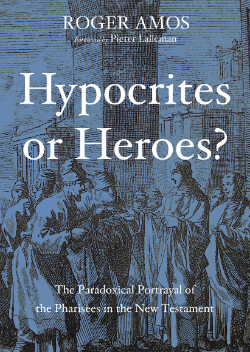Were the Pharisees really so awful?
Retired Baptist minister Roger Amos explains how he came to write his recently published book Hypocrites or Heroes?
 During the closing years of my pastoral ministry I became preoccupied with the question: precisely who were the ‘sinners’ that the gospels mention in many places?
During the closing years of my pastoral ministry I became preoccupied with the question: precisely who were the ‘sinners’ that the gospels mention in many places?
Aware that over 30 years had passed since my theological training I enrolled for the London School of Theology’s excellent MA (by Distance Learning) course in Aspects of Biblical Interpretation.
I had retired by the time that I finished it. My dissertation on Matthew’s understanding of the ‘righteous’ and the ‘sinners’ centred on the dinner in Matthew’s house when the Pharisees criticised Jesus for dining with tax collectors and ‘sinners.’
This raised a new question: why did the Pharisees, commonly regarded as Jesus’ adversaries, expect Jesus to behave as they themselves did? The logical explanation conflicted with traditional evangelical teaching: that Jesus and his disciples were themselves Pharisees.
As my research progressed I found confirmation of this elsewhere in the Gospels; it became the turning point in the dissertation’s argument because of its implications for my original question.
I concluded that the ‘sinners’ were Jews outside Pharisaism; the Gospels assume a Pharisaic environment, Pharisaism being the normative Judaism of first-century Palestine.
An internet search to discover whether any established scholars had reached similar conclusions led me to Professor Hyam Maccoby’s book, Jesus the Pharisee.
The closing date for submitting my dissertation was almost upon me and I had time to read only the passages most relevant to my argument. After the dissertation had been submitted I read the book right through and learned of further paradoxical elements in the New Testament’s portrayal of the Pharisees.
better understanding of the Pharisees should give fresh insight into Jesus himself
Reading that book gave me an idea. Now there was a vacuum in my life: I had submitted my MA dissertation; health issues had forced the suspension of my preaching ministry; I needed a new project and enjoyed biblical research. I would study for a PhD, my doctoral dissertation being partly a critique of Professor Maccoby’s book.
However, an impending family crisis might have prevented me from completing the PhD in the allotted time, so I did not register. Nevertheless I decided to undertake the research and write the dissertation that I might have submitted and, if it seemed to command sufficient interest, I would try to publish it as a book.
The research and writing took just under three years, the family crisis helpfully holding off until the month the book was finished! In fact the book is more than a critique of Jesus the Pharisee.
Subtitled The Paradoxical Portrayal of the Pharisees in the New Testament, it examines some 200 references to Pharisees besides other paradoxical elements in Jesus’ ministry that had engaged me for years.
For example, why is Jesus sometimes on amicable terms with the Pharisees and sometimes at loggerheads with them? Although Jesus denounces them as hypocrites six times in Matt 23, in the same chapter he acknowledges their authority as interpreters of the law and urges obedience to them.
Although the gospels imply that the Pharisees conspired to kill Jesus, ordinary Jews championed them as heroes, so they cannot have been entirely bad.
There were so many contradictions to resolve! In a nutshell, I concluded that Jesus’ ministry divides into an early phase when he was himself a Pharisee and sought to reform Judaism; and a later one when he sought instead to build a new community from the ‘sinners,’ Jews whom the Pharisees had excommunicated.
I was delighted when the book was accepted by the second publisher I approached. As an English author I found working with an American publisher an interesting and uplifting experience! I’m grateful for the help and encouragement of John King of the Percival Guildhouse in Rugby, Michael Bochenski, minister of Rugby Baptist Church, and Pieter Lalleman of Spurgeon’s College, who not only contributed the Foreword, but also spotted many errors and omissions.
Why should anyone today be interested in the Pharisees? Simply because so many of the incidents recorded in the gospels involve Jesus’ dealings with them: better understanding of the Pharisees should give fresh insight into Jesus himself.
If you want to know more, read the book! My hope is that the book will stimulate interest in Biblical Studies and in Jesus. It uses a jigsaw-puzzle analogy to show how a composite picture can be built from pieces, even when some are missing. I am now working on a sequel and hope, now that the family crisis is over, that I may yet register for a PhD.
Hypocrites or Heroes? is published by Wipf & Stock of Eugene, Oregon, and is available from Amazon and other bookshops. Its UK Amazon price is £18.00 paperback and £6.60 (Kindle edition).
The Revd Roger Amos is a retired Baptist minister who has served churches in Tenterden, Coventry, Northamptonshire and Birmingham
Baptist Times, 19/08/2015